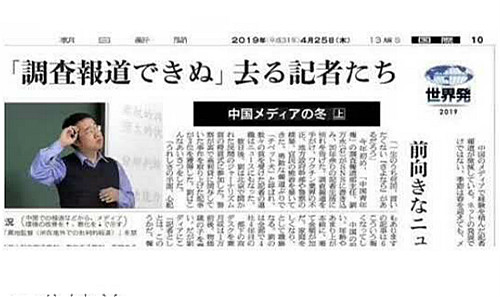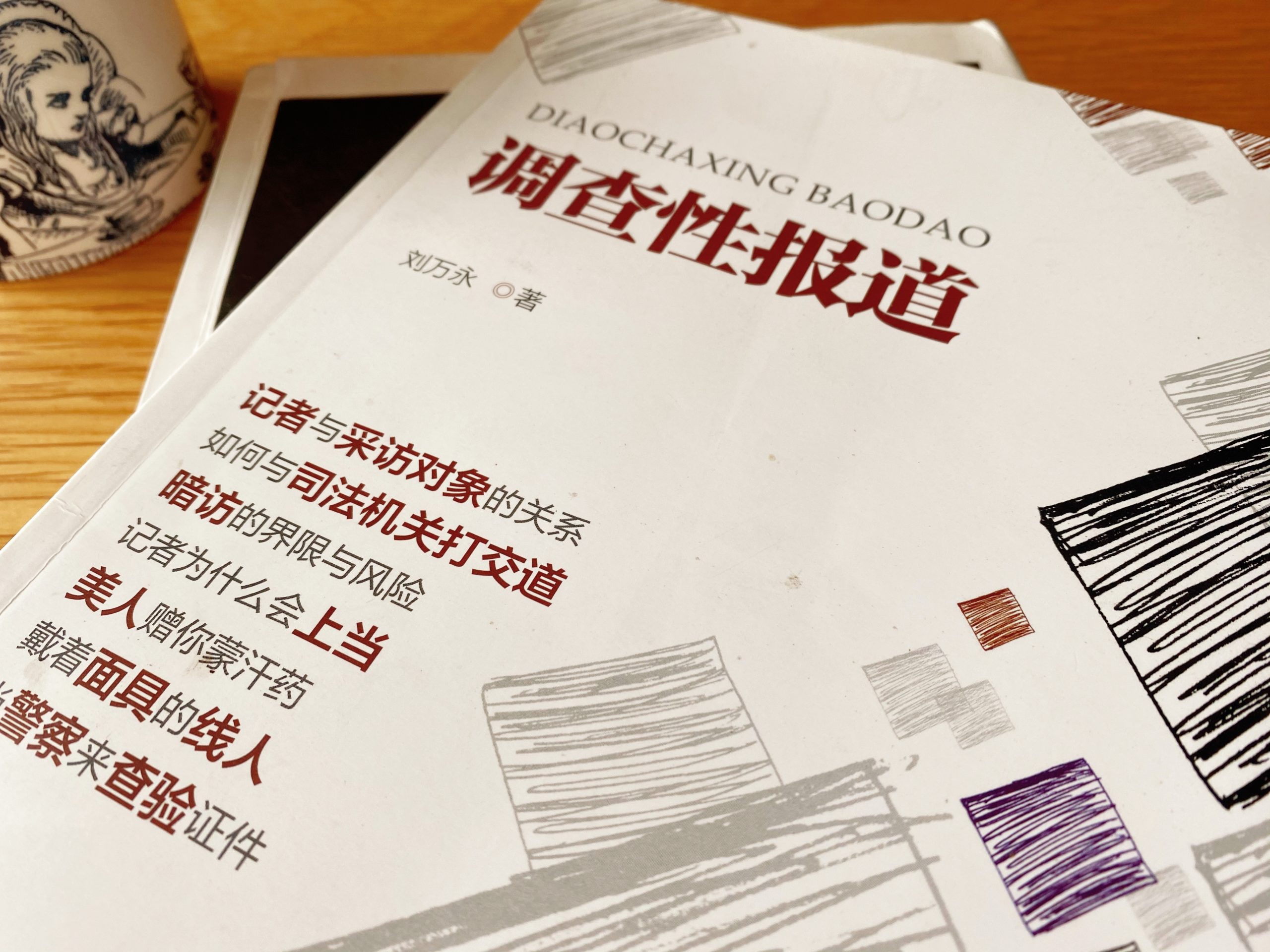Prominent investigative journalists have fled in recent years, with only about a hundred are expected to left. Whether Chinese investigative journalists are heading for the wall?
When Wanyong Liu finished the topic selection meeting, he told everyone that he had already submitted his resignation, all the journalists in the department were very quiet, but the expression is complicated. They knew that he was about to leave, but did not expect it to happen so soon.
The dissolution of the deep investigation department of China Youth Daily happened after the director, Wanyong Liu resigned. The five other members all found their ways instead of being investigative journalists. China Youth Daily is one of the most serious traditional media in China, aims at helping China youth to broaden their horizons and increase their knowledge. However, even this one organization, they no longer support investigative journalists.
More than half of the investigative reporters chose to resign within five years before 2015, while Liu Wanyong were still insisting at that time. “No matter how many people leave in disappointment or sadness, there are always people who come in full of ideals and still on their way. What we can do is to take this dream and go further and further. Even if you leave, you have to be a person standing on the side of the road clapping.”

Now, he left the media industry and took a job that paid six times more than before. “My life finally back to normal,” his anxiety finally stopped as well. He said that his anxiety was like his desk in his newspaper office, full of newspapers, even though he would tide them up every day, it soon returned to its original state.
“My mobile phone albums also back to normal, from full of verdicts related to the story to the photos and short videos of my three-year-old daughter, “but his social account still published contents related to news. “It is inertia”, said Wanyong.
Peers often jokingly call journalists with large publications as “crazy dogs”, while Wanyong is called “the Tibetan mastiff”( an extremely fierce and strong breed of dog) instead. He not only published a lot of articles but also required excellent quality.
“The business experience of a retired senior official”, “The daughter of a political commissar of the Public Security Bureau going to university in disguise”, “A young man who reported cheating in the examination of a classmate was arrested across provinces”, and “The record of the director of the Ministry of public security to clear the injustice”, these are his masterpiece.
His new employer does not want him to stand in the whirlpool of public opinion as before, so he has rarely spoken publicly or even stopped tweeting on Weibo.
Wanyong’s stepping down is not surprising. Under the impact of the internet and fast living speed, the audience is shrinking, resulting in a small margin for investigative journalists to survive and less investigative reporter would like to stay in this industry.

Zhian Zhang, who is the dean of the School of Media and Design, Sun Yat-sen University, is called “the person closest to the industry”. He committed to the study of investigative journalists in China for years. He published an article in 2017 and said that “There are only 175 registered investigative journalists in China, while 130 are working for traditional media.”
Compared to the total of over 228,000 journalists, the number of investigative journalists is no more than eight over ten thousand. According to Zhian Zhang, this proportion is likely to get even smaller in these three years, as there are more investigation departments dissolved, more investigative journalists switched their careers.
Jiaxing Wang, a reporter who used to work for Wanyong, has been forced to quit his career as an investigative journalist. He said he is a features reporter now, write some mild stories, no institutional issues involved.
Talking about his career change, he said that it seems like a minor change but an inevitable trend. “Investigative journalists have fewer topics to cover. I have few opportunities to write investigative articles.”
He attributed the current state to an increasingly disciplined government and a more stringent audit system.
Government workers are more organized in their work. It does not only mean that they commit fewer mistakes but also signifies that they say little about what the media truly wants to know. Journalists’ investigation becomes harder.
The official censorship becomes stricter these years. “There is a room in the building of China Youth Daily,” said Cindy, she is an editor who works there. “All prohibitions include restrictions imposed by various government agencies on what we report, are locked there.
“The key is kept by a commissioner, only department heads are likely to be ushered in.”
In fact, Jiaxing said that his leaders rarely read the injunctions, as they are always sensitive to what is off-limits. This “self-censorship” which they call may lead to plenty of limitations in the selection of topics.In addition to lacking topics, Jiaxing found himself cannot identify his personal values.

The identity of the investigative reporter working for China Daily Youth cannot win respect for him, sometimes he was treated badly because of his job. Even now he will see loads of personal attack when he searches his name on a social platform.
He was not only troubled by the audience’s incomprehension, but also by his salary. Instead of gaining his June salary, he paid the newspaper ¥9.06 (about £1), he refused to talk about the specific reason.
Jiaxing doesn’t feel satisfied with his emolument, as the newspaper offers a little base salary, the money he would receive every month is determined by the number of articles he writes. Because of the nature of his work, each manuscript needs two or three weeks to produce on average.
He also suffered from depression and PTSD. “I have always resisted reminiscing about my experiences at the end of this January,” he was locked down in Wuhan because of the epidemic at the beginning of this year and published as a reporter, “It was a painful and desperate time—as a journalist and a Wuhan citizen.
“I have planned to sort out the records, and then temporarily sealed up the experience. It seems impossible, I always write myself to cry.”
He confessed he is a sensitive and empathetic person, but he never sheds as many tears as he has in these past few months. “The smallest things make me cry.” Until a doctor told him this was a classic PTSD symptom, he felt relieved.
After that, he decided to take the rotation and work as an editor temporarily, “It’s less stressful. I don’t have to worry about choosing the topic day and night.”
Although Jiaxing made it clear that he would not give up his job as a journalist, he still felt that he needed a good rest.
As the print media fades, Zhian found that the integration and transformation of traditional media have opened up a new communication platform and professional space for investigative journalists. In this way, more journalists get a chance to be involved in.
In July 2014, The Paper launched a series of in-depth investigation reports as soon as it went online; in April 2017, The Beijing news announced that “it will increase the investment of at least 20 million yuan to find the best journalists”. All this behavior has been seen as a signal of encouragement to the journalists.
Some journalists who do not really be recognized as investigative journalists begin to working on investigative news and contribute to the new media platform. They serve their own responsibilities and fulfill the desire of being investigative journalists at the same time.
Zoey worked for The Beijing News is a reporter who has been mainly in charge of news about gardens and landscape, writting some short news pieces every day. Because of the reduced number of journalists in her organization, she gets the opportunity to find her own topics and write the investigative stories that interested her.
She still did well in her first article on how hard to buy depression drugs during the epidemic, despite having no professional training in investigative reporting. She was excited that she could produce In-depth news across departments.
“There is a chain of contempt among journalists, the investigative journalists are at the top of the chain. Maybe this is the time for me to change my place in the chain.”
said Zoey
Becoming a “part-time” investigative journalist makes Zoey feel happy, “In addition to satisfying my desires, also you may call it ‘vanity’ to some extent, I also want to transmit their voices (the interviewee’s voice) through my article and win social attention,
“This is my most rewarding time as a journalist, I finally felt that my manuscript was worth something.”
This new work pattern allows journalists to cultivate the ability to dig deep for the truth, and it’s also an opportunity for the whole industry to develop.
“Investigative journalism should be acquired by every journalist, it’s like a basic skill,” Anqing Chen, who established a private journalism training institutions, he used to work as an investigative reporter years ago.
“Journalists in the past have relatively low education and ability, that’s why it is essential to choose a few excellent ones to write features. In fact, every journalist should have the ability to write a full-length manuscript.” Said Anqing, he did not evaluate the investigative news now, but the work pattern similar to Zoey’s did coincide with his expectations.
Except for journalists like Zoey, there are some who focus on the new media platforms. Zhian finds that the group of investigative journalists suggested by his survey in 2017 is growing these years, and their job satisfaction is also getting higher than that of traditional media journalists.
They are quicker and more direct to realize money through new media channels, this makes their salaries relatively rich, which could be a reason for the prosperity of this industry. The low admittance threshold compared to that of traditional media has also become a favorable condition for attracting talents.
The higher degree of their job satisfaction is not only contributed by their higher salary, but also by a wider topic range. These journalists are generally believed to enjoy a higher degree of freedom and become more outspoken as a result. The media they work for does not publish print versions, so the regulatory environment for them is relatively loose.
Some accounts using the similarities of nonfiction writing and the investigative news to publish some stories under the banner of nonfiction writing to pass the strict censorship on investigative news.
This kind of non-fiction writing is in journalism rather than literary, even if there are no clear boundaries. The writers said that their writing is kind of like the “inheritance and development” of “New Journalism” popular in the USA in the 1960s.
A journalist whose name is Qiang Du published a feature called “the biography of those who experienced the great escape in the Pacific Ocean” on the online magazine ESQUIRE (Chinese version), originating from a real murder case happened on a fishing boat 10 years ago.
In December 2010, 33 crew members on the “lurongyu 2682” fishing boat went to sea. However, Eight months later, when the fishing boat was found eight months later, there were only 11 crew members on board. The 11 surviving crew members were sentenced to kill 22 companions, six of them were sentenced to death and five were sentenced to fixed-term imprisonment.
Qiang interviewed one of the crew members who is believed to kill his partners after he was released from prison and restored the whole story. After its publication, its content value has attracted great attention in the media circle. In addition to the high clicks, LETV bought the film and television adaptation right at a high price, and a radio play also went online not long after that.
Due to the content and business value of the nonfiction writing, it is also be seen as a way out in the new media field. Nonfiction writing has done a part of the media’s job that is hard to do.
Some scholars, such as Anqing Chen, scoff at it, they believed that these writings do not come under scrutiny and the means of proof is not perfect. Although part of scholars refused to admit it belongs to news writing, they cannot deny that the platforms that specialize in nonfiction still attract a lot of readers.
The booming nonfiction writing has partly filled the absence of investigative journalism now, even if it cannot completely replace professional investigative reporting in the traditional media. It is more like journalists digging a tunnel through a closed alley. A word is popular among this group of practitioners “There are always more ways than difficulties.”
Zhian’s survey did not include this part of journalists working in the nonfiction area, it could be the result of journalists working for the accounts are highly mobile, and their identities are also hard to pin down.
According to Zhian, his survey found that the overall employment declined, and the gender composition of investigative journalists is similar to that of the past. It is still male-dominated employment and males’ average age is 34.8, younger than before. Female journalists increased and most of them are younger at an average age of 32.3.
Compared to the survey before, the journalists got younger, and became better educated, 20.9% got a post-graduate degree. Thanks to the improvement of journalism education, more students choose to learn journalism after their senior high school. Even though the journalist group is under the danger of stigmatization, a large group of people hopes they could “report on social problems to help form a better society”.
Zhian also found that most of the investigative journalists enter the industry for “interest” reasons.
“The most attractive factors for investigative journalists are ‘exposing social problems, maintaining fairness and justices’, ‘expressing the voice of the people’, ‘disseminating new ideas and enlightening the people’.”
Said Zhian.
“It can be seen that the values of promoting social equity and justice have the most appeal to investigative journalists; the most disagreed reasons for choosing jobs are ‘higher income’ and “having opportunities to become famous” the utilitarian motivations.”
Pure career motivation does not lead to career loyalty. “About 44% of the investigative reporters said that they would not engage in investigation and report in the next five years,” said Zhian.
He analyzes that the salary of ¥5000-15000 (68.9% investigative journalists’ salary, 15.2% journalists even earn the salary less than ¥5000. ¥5000 approximately equal to £568, ¥15000 approximately equal to £1705) cannot fulfill their need to support their families.
Another reason is that they have to lead a stressful life, as they have to face different barriers, from “interview difficulties to press pressure”. “Responsibility to the interviewee and the whole society is what keeps me working” said Jiaxing. It’s similar to the result of Zhian’s Survey, “Investigative journalists attach great importance to ‘reporting reliable information to prevent the spread of rumors’” the most.
To break through the barriers, journalists help each other in their special way. Among them, peer cooperation is a very common phenomenon, “84% investigative reporters interviewed mentioned ‘Share sources’, ‘provide or receive background information’, ‘share factual information obtained in interviews’,” said Zhian.
On the one hand, it is the result of the concentration of investigative reporters. Fewer newspapers support investigative journalists. Zhian mentioned in his article “Has the cold winter of the investigative reporter has arrived” The largest number of investigative journalists are mainly concentrating on the media such as The Paper, Caixin media, The Beijing News, Jiemian news, Beijing Youth Daily, southern weekend, Southern Metropolis Daily, Dahe news and China Youth Daily
These nine media has gathered about 40% of the current investigative reporters in China, mostly spreading among cities, Beijing, Shanghai, Guangzhou, and Zhengzhou with their media headquarters located.
On the other hand, the high degree of their professional identity also caused peer cooperation. “The survey reporter group generally believed that the investigative reporters were ‘more comprehensive quality’, ‘more important to society’ and ‘more respected’” said Zhian.
Although the news format has changed significantly under the influence of new media, the investigative reporters have high stability in their career choice motivation and role cognition.
If there are possibilities to provide sufficient reporting space, reshape the professional identity of investigative journalists, and constantly improve their job satisfaction and loyalty, the number of investigative journalists could be expected to maintain or even increase in the future.
